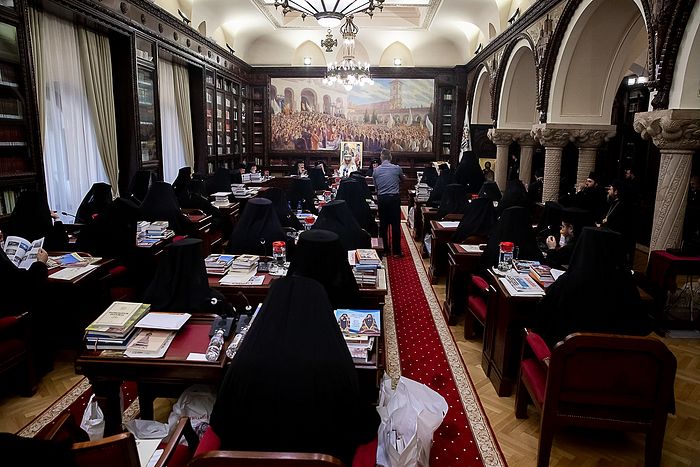Bucharest, February 21, 2019
The Romanian Holy Synod met today under the chairmanship of His Beatitude Patriarch Daniel for its first session of 2019. Among the agenda items was the ongoing crisis situation in Ukraine.
In a January interview, Archbishop Daniel of Pamphylia of the Ukrainian Orthodox Church of the USA, one of Constantinople’s two Exarchs to Kiev who helped prepare for mid-December’s scandalous “unification council,” predicted that the Greek and Romanian Churches would be the first to recognize and accept, by the end of February, the so-called “Orthodox Church of Ukraine” that was created by Constantinople at the “council” and given a tomos of autocephaly on January 6.
In his opening remarks, Pat. Daniel spoke about the tension in Ukraine and noted that there are currently 127 parishes in Ukraine with Romanian communities, calling on the Holy Synod to consider their pastoral care, reports the Basilica News Agency. These parishes, mainly in northern Bukovina, are reportedly very troubled by the recent events in Ukraine.
The Synod made several points about the Ukraine situation in the official communiqué on the session’s results.
The bishops first note that the schisms in Ukraine have persisted for 30 years and that there was not even an appeal for pan-Orthodox mediation, as was done in the case of the schism in Bulgaria. Seeing this impasse, the Ecumenical Patriarchate granted a tomos of autocephaly to the hierarchs, clergy, and laity who were in schism from the Russian Church and the entire Orthodox Church. As the Synod notes, this tomos was accepted only by those Ukrainians not in communion with the Russian Church.
It is important to note here that the Romanian Church thus still considered the members of the so-called “Orthodox Church of Ukraine” to be schismatics when they received the tomos on January 6, even after they were received by the Patriarchate of Constantinople on October 11.
Therefore, ecclesiastical unity has not yet been achieved in Ukraine, “because there is a large population of Russian ethnicity that keeps a direct link with the Moscow Patriarchate,” the Romanian Synod writes.
However, the canonical Ukrainian Church under His Beatitude Metropolitan Onuphry of Kiev and All Ukraine remains by far the largest Church in Ukraine, with millions of ethnic Ukrainians also remaining faithful to the Church that is an autonomous body within the Russian Church.
The Synod then reiterates the view expressed at it May 24 and October 25 sessions, recommending that the Moscow and Constantinople Patriarchates find a solution to the conflict through dialogue, preserving the unity of the faith, respecting the administrative-pastoral freedom of the clergy and faithful of Ukraine (including the right to autocephaly), and restoring Eucharistic communion. In their October statement, the bishops emphasized that synodality is “a permanent necessity in the life of the Church.”
In the event of the failure of bilateral dialogue, then it will be necessary to convene a Synaxis of the primates of the Orthodox Church to solve the problem, the Synod writes.
For a concrete decision, priority will be given to the consideration of the 127 Romanian parishes at a future Synod session. It is necessary to consult with these parishes, the bishops state, as they are concerned about preserving their ethnic and linguistic identity.
Thus, the Synod writes that it is necessary to obtain written guarantees from the Church authorities that the Romanians’ ethnicity and language will be respected and that they will have the opportunity to organize into a Romanian vicariate and to cultivate their spiritual connection with the Romanian Patriarchate.
The statement also mentions that a Ukrainian vicariate has operated in Romania since 1990.
The Romanian Church will also request that Constantinople clarify the problem of the non-canonical hierarchs and priests in the West, who belonged to the former “Kiev Patriarchate.”
The Holy Synod will express its official position following the above-mentioned consultations.
Follow us on Facebook!

